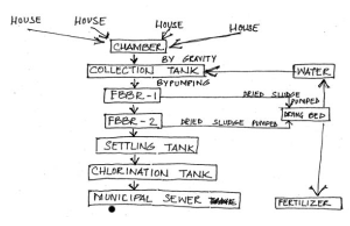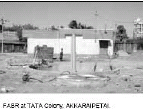<<< Previous
|
|
Next
> >>
|
| FBBR- FLUIDIZED BIOLOGICAL BED REACTOR |
Design Concept
 Wastewater is treated through the aerobic process in FBBR-1 and FBBR-2.
Sludge is first dried in the drying bed and then used as a fertilizer.
Pathogens are removed with the help of chlorination. Traditionally Fluidized
bed filter consists of a bed of granular media maintained in a constant
state of expansion or fluidization.The media consists of particles with
water negative buoyancy like sand, plastic beads, glass beads, crushed
shells.
Wastewater is treated through the aerobic process in FBBR-1 and FBBR-2.
Sludge is first dried in the drying bed and then used as a fertilizer.
Pathogens are removed with the help of chlorination. Traditionally Fluidized
bed filter consists of a bed of granular media maintained in a constant
state of expansion or fluidization.The media consists of particles with
water negative buoyancy like sand, plastic beads, glass beads, crushed
shells.
The biofilm in the fluidized bed reactors is evenly distributed throughout the reactor. In fluidized bed, each particle becomes coated with biofilm that grows as organics and other nutrients are extracted from the passing water.
 The microorganisms of the biofilm degrage the pollutants, This
technology, designed by NEERI [National Environmental Engineering Research
Institute] Nagpur is feasible in settlements with population of more than
200 houses. This system is highly energy intensive, requires highly skilled
workers for construction as well as for operation and maintenance. It needs
uninterrupted power supply.
The microorganisms of the biofilm degrage the pollutants, This
technology, designed by NEERI [National Environmental Engineering Research
Institute] Nagpur is feasible in settlements with population of more than
200 houses. This system is highly energy intensive, requires highly skilled
workers for construction as well as for operation and maintenance. It needs
uninterrupted power supply.
g
|
Consultation on Habitat Planning and Development: Post Tsunamishelter
reconstruction perspective inTamil Nadu. http://www.un.org.in/untrs/reports/Shelter_Habitat_2007_Consultation_rep ort_draft.pdf [C.eldoc1/0707/TS1_Shelter_Habitat_2007_Consultation_report_draft.pdf] |
|
|
<<< Previous
|
|
Next
> >>
|